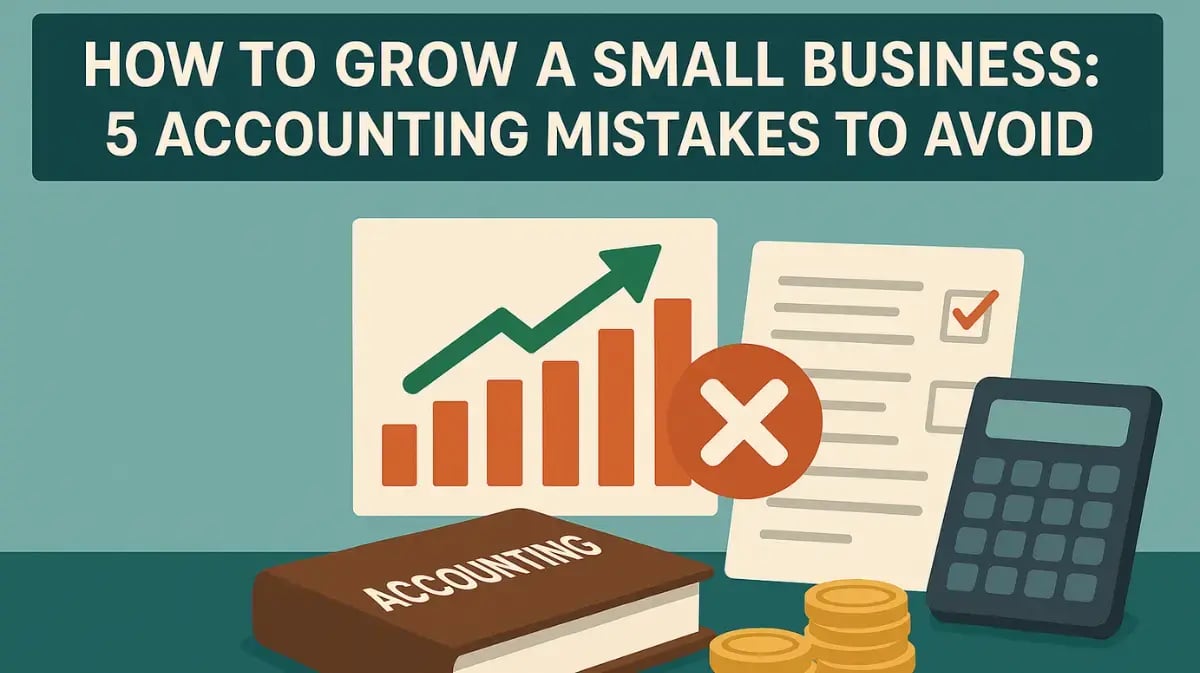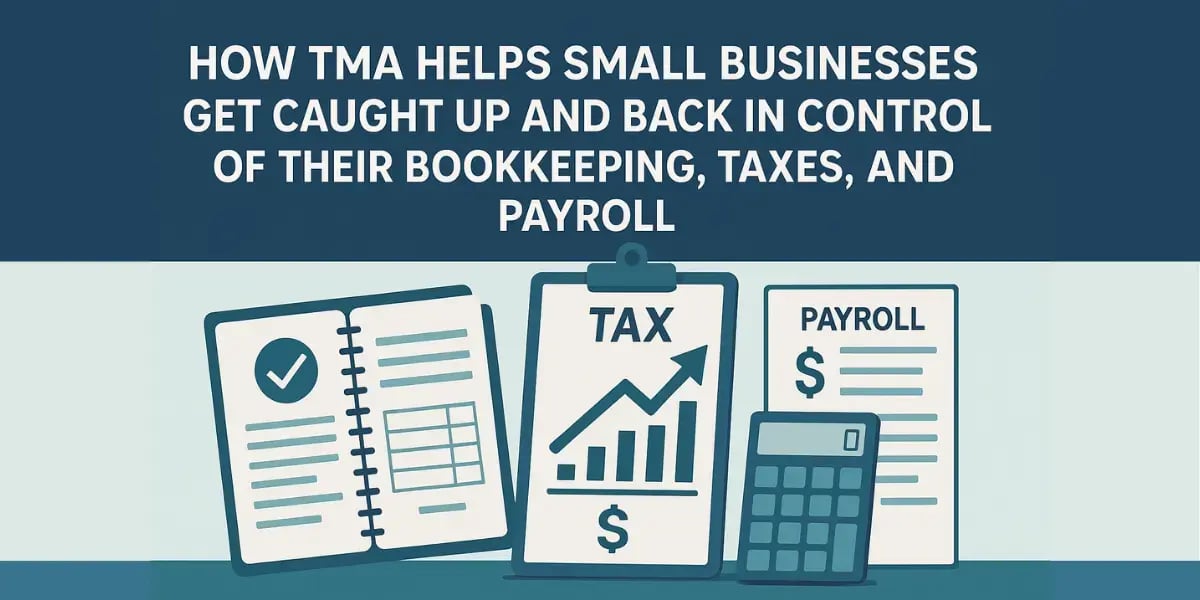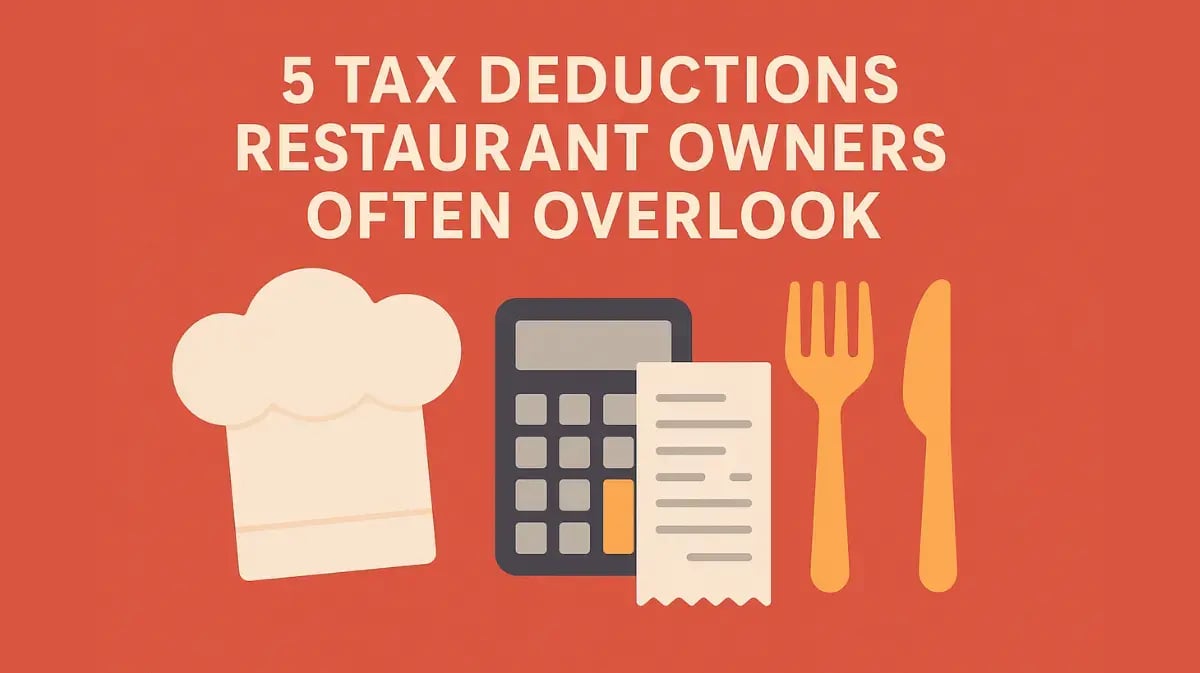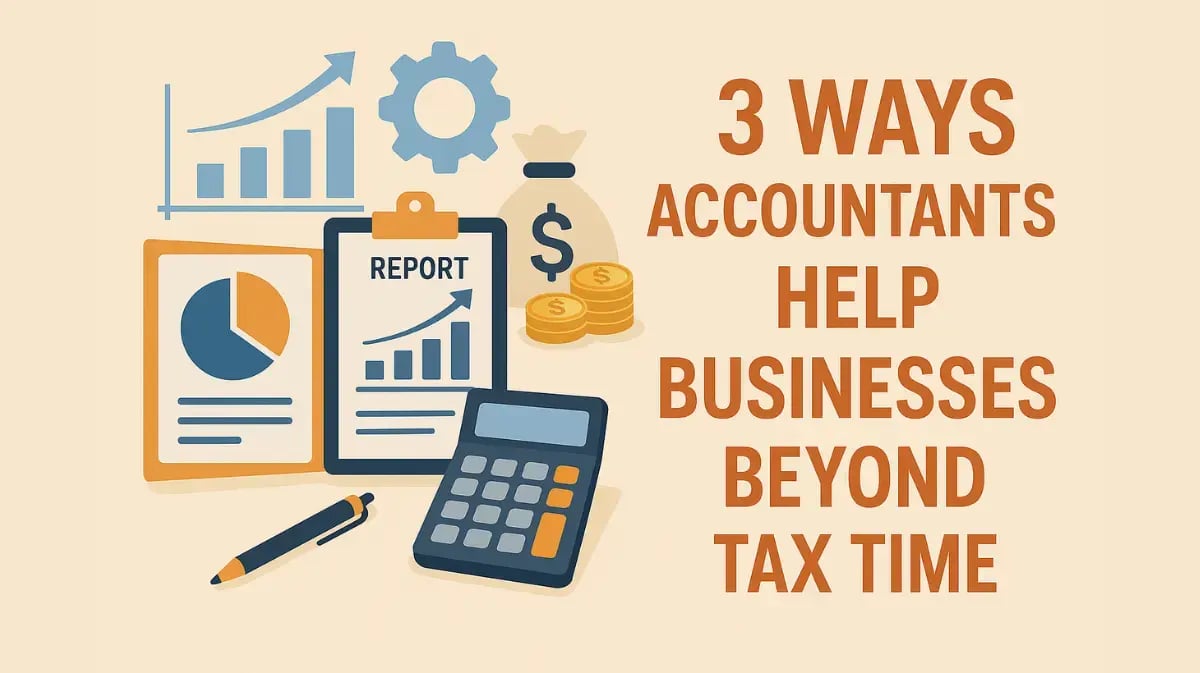How to Grow a Small Business: 5 Accounting Mistakes to Avoid
July 15th, 2025
4 min read

Growing a small business can feel like a dream coming true.
More customers. More revenue. A bigger team.
But along with that success comes more people, more overhead, and more moving parts. And for many small businesses, accounting becomes one of the first things to get messy.
Did you start out with a spreadsheet and a shoebox of receipts? That might have worked when you were small. But as you grow, the cracks begin to show. Suddenly, bills get paid late, payroll becomes confusing, and tax deadlines arrive before you’re ready.
This isn’t because you’re bad at business. It’s because growth brings complexity, and if your accounting systems haven’t grown with you, that complexity turns into chaos.
Here are five common accounting challenges that business owners face when scaling their operations, and why recognizing these challenges early can save time, money, and stress in the long run.
1. Don’t Get Limited by Bookkeeping that Can’t Keep Up
When a business is small, it’s relatively easy to keep track of income and expenses. You might manage your books in a spreadsheet or with simple software. But once you start taking on more clients, offering additional services, or processing a larger volume of transactions each week, your original system often can’t handle the load.
Every invoice, vendor payment, expense reimbursement, and customer deposit adds to the stack. The bookkeeping process that once took an hour or two per week suddenly demands full afternoons—and even then, it may still fall behind.
The issue isn’t just the time it takes. It’s the increased risk of mistakes. A missing invoice, a duplicate expense, or a miscategorized transaction can distort your financial picture. Over time, small errors snowball, making it harder to understand your business’s true performance or prepare accurate tax filings.
As your transaction volume grows, bookkeeping needs to evolve into a streamlined, automated, and reviewed process. This helps your data get collected and become trusted, organized, and ready to inform your decisions.
2. Hard to Predict Cash Flow Becomes a Liability
Many business owners are surprised to discover that growth can strain their cash flow. You might be making more money on paper, but your bank account tells a different story. It’s not uncommon to feel “broke” despite your business being technically profitable.
This disconnect often comes down to timing. As you grow, the gap between when you incur expenses and when you get paid can widen. You may invest upfront in equipment, marketing, or staff before revenue from those investments starts to come in.
Growth may also involve extending credit to customers (if applicable), resulting in longer receivables cycles. Or it may require hiring ahead of demand, leaving you with payroll obligations before you’ve collected payment.
Without clear insight into when money is flowing in and out, you may unintentionally overextend, taking on commitments that your cash reserves can’t cover. This creates stress, puts bills and payroll at risk, and can lead to difficult decisions about who gets paid and when.
Understanding cash flow is about more than watching your bank balance. It means building projections, tracking patterns, and being able to see what’s coming next week, next month, and beyond.
3. Tax Compliance Gets More Complicated
Tax time is rarely a business owner’s favorite time of year, but it becomes even more challenging during growth. As your income increases, so do your responsibilities to various tax authorities. You may now be required to make estimated tax payments throughout the year, file new forms, or report earnings in multiple states.
You may also cross thresholds that trigger new requirements, such as collecting and remitting sales tax in new jurisdictions or handling 1099s for contractors.
Unfortunately, most tax authorities don’t make it easy to know when you’ve hit those triggers. Rules vary widely by state and industry, and the penalties for making a mistake can be steep, even if the error was unintentional.
The truth is that previewing your tax situation isn’t just for big corporations. Even small businesses benefit from a proactive approach that keeps pace with growth. It’s not just about filing correctly—it’s about avoiding surprises, reducing liability, and keeping money in the business rather than sending it off in penalties or late fees.
4. Payroll Turns into a Compliance Headache
Hiring your first few employees is a major milestone, but it opens the door to one of the most complex areas of business operations: payroll. What seems straightforward—just paying your people—quickly becomes a tangle of rules, forms, deadlines, and deductions.
Payroll taxes must be calculated and remitted to the correct agencies. Wage and hour laws must be followed precisely. Benefits must be tracked, and deductions handled correctly. If you operate in multiple states, you’ll likely face different regulations for each location.
Even simple mistakes, like forgetting to file a quarterly return or misclassifying a worker, can result in fines or even an audit. And if paychecks are ever late or incorrect, it can harm employee morale and trust, something no growing business can afford.
Payroll isn't just a matter of getting people paid; it's about compliance, accountability, and recordkeeping. And as your team grows, so do the stakes.
5. You Don’t Have the Insight to Make Smart Decisions
At the early stages, many business owners know their numbers by instinct. They can tell you their revenue, top expenses, and whether they’re on track, without needing to pull a report.
But as a business scales, those instincts become harder to rely on. With more moving pieces—multiple service lines, vendor contracts, team members, and locations—it’s no longer possible to "feel" the health of the business.
That’s when financial blind spots start to appear. Without timely, accurate financial reporting, you can’t identify trends, spot inefficiencies, or course-correct in time. You may underprice services, overspend in a key area, or invest in something that isn’t generating a return.
Business owners often find themselves making big decisions without solid data to back them up, flying blind. That’s risky in any environment, but especially during growth, when every dollar counts.
Clear, consistent reporting empowers you to act decisively. It can allow you to plan, forecast, and communicate with confidence, whether you’re talking to lenders, partners, or your own team.
New Responsibilities Brought by Growth
If any of these challenges sound familiar, you’re not alone. These are the most common challenges we encounter among small businesses. They don’t mean you’re doing anything wrong. In fact, they mean you’re doing a lot right—you’re growing.
But growth always comes with complexity. And ignoring these challenges won’t make them go away. In fact, left unchecked, they can stall momentum, drain resources, or even put your business at risk.
The good news is, you don’t have to tackle this alone. You deserve support that grows with your business, helping you focus on what you do best.
At TMA Accounting, we help business owners simplify the financial side of growth. From better bookkeeping systems to helping you preview your tax situation, we take the pressure off so you can lead your business with clarity and confidence.
Let’s talk about where your business is headed—and how we can help you get there with less stress and more control.
Reach out today to schedule a conversation and learn more about our growth-ready accounting solutions.
Blog Disclaimer: Nothing in this post constitutes legal, tax, or financial advice and is intended for informational and educational purposes only. This informational and educational material is not intended, and must not be taken, as legal, tax, or financial advice on any particular set of facts or circumstances or as recommendations that are suitable for any specific person. You need to contact a lawyer, accountant, or financial adviser licensed in your jurisdiction for advice on your specific questions, issues, and concerns. View our full Terms of Use here.
Julie Myers, CPA, is a Senior Accounting & Tax Manager at TMA with 25 years of experience helping business owners solve problems and navigate their tax situations.























